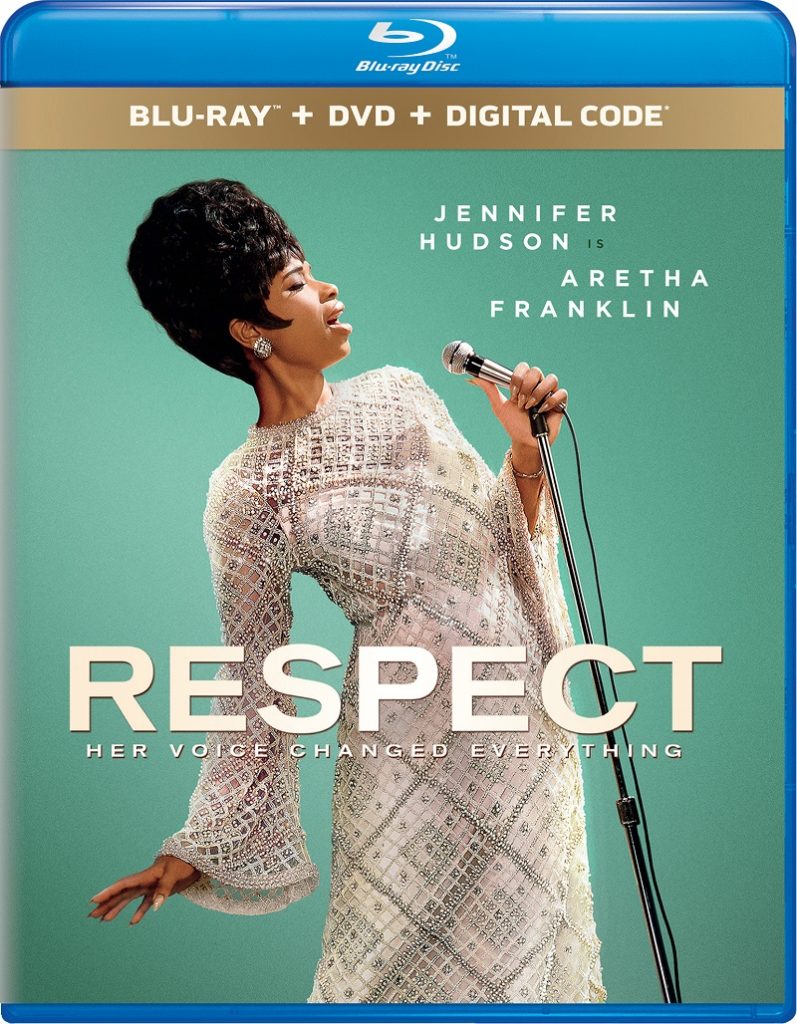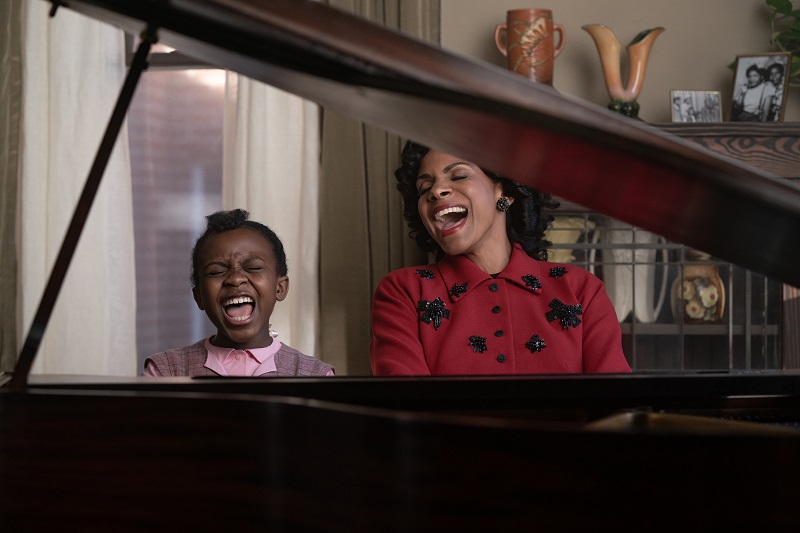One of my big cinematic pet peeves involves the musical biopic. That beast of a movie project is no easy task. A filmmaker is charged with bringing to life a musical existence lived to the fullest where in some cases, enormous social implications were involved that helped change the world as we knew it. That is certainly the case with Respect, the outstanding encapsulation of the life and times of the Queen of Soul, i.e., Aretha Franklin.
In case you hadn’t already heard, Franklin is portrayed by Oscar winner and former American Idol breakout, Jennifer Hudson. Yes, that. So, it is pretty much a given that the actress will explode off the screen, both musically and dramatically—more on that later. But… how does it measure up on the musical biopic landscape, one notoriously for eating its appreciators in the process?
Respect is out on DVD, Blu-ray, and various digital formats now and is a can’t miss! In fact, the recommendation to purchase is high. Over the course of a lifetime and for a myriad of reasons, this film adaptation of Franklin’s sonically succulent life journey is one to treasure and will be returned to frequently.
First off, the biopic possesses one of the smoothest of transitions between the young protagonist and the adult she becomes. Skye Dakota Turner is phenomenal. Director Liesl Tommy (Jessica Jones, The Walking Dead) and her four-person casting team scoured the Earth and found the young actress playing Tina Turner as a girl during the roadshow for Tina. Once you’ve played young Turner, seems like a natural progression to inhabit Franklin! Dakota breathtakingly sets the table, and then Hudson makes the character portrayal perfection.
Aretha’s dad was a well-known preacher in Detroit, Michigan in the fifties and for the decades that followed. Oscar winner Forest Whitaker mesmerizingly captures the man. He was the first to notice the G-d given gift that his daughter possesses. The film commences with her at around the age of ten and tackles a large swath of her life.
Tommy’s film accomplishes something that is sadly too rare. It does an excellent job of going through the enormity of a life so lived. Usually, biopics, particularly ones centered around musicians, can feel spread thin touching on life moments like a greatest hits album whips through an artists’ music library. It never slows down to appreciate and celebrate those important individual moments. Respect plays more like a study of a legendary life that leaves the viewer a deeper understanding of the subject in addition to a further appreciation for the genius at the soul of the story itself.
For example, it was shocking news to learn that a large handful—numerous!—albums that served as Franklin’s first, languished in Billboard’s version of the waiting room for hell. She was hungry for hits, but something had to give. Most would agree that whatever changed certainly worked. The singer was the first female artist inducted to those hallowed Cleveland, Ohio halls.
On the rare occasion, Tommy seems to insert drama to maintain a perceived ebb and flow of how a film is supposed to progress. For example, there is the mention of that famous Time magazine article on the singer that exposed a side of her life that she probably wished had stayed quiet. Then, history goes and illustrates otherwise.
Marlon Wayans is Ted White, a man for whom her family does not care. So of course, she married him and made him her manager. Their rocky chemistry is absolutely on purpose. Yet, if one dives a little deeper, there are moments where one may be inclined to think that Wayans is miscast. The man has vats of talent, and perhaps this has to do more with the character created by screenwriter Tracey Scott Wilson, from a story by her and Callie Khouri. Yes, he’s not the easiest of men to “like,” but this is more. Something is askew, but it never distracts—don’t get me wrong.
Whitaker portrays White as a man of his day in such a manner that it is a true salute to a man who called Martin Luther King friend and possessed the contacts to open record company doors for his daughter—not that she needed it, I mean come on. The Oscar winner captures the seismic change of the sixties and how there was a marked difference between the generations of parent and child. Aretha was a church-going girl all the way through and her father raised her well. But they had disagreements about how to tackle social issues and when non-violence and when initiative-taking measures need to be taken. It’s a refreshing look at the conversations that many had in their homes over fifty years ago.
Hudson is a revelation, which should surprise nobody. She should receive her second Oscar nomination for her turn as Aretha Franklin. Will She? It is honestly too early to tell and there is still much movie land to conquer before 2021 becomes 2022. Respect is the Jennifer Hudson show, but she also intrinsically has such a giving spirit that it comes through on every single frame of her uncanny ability to be such a spoke in a wheel that is the ensemble of a film. There is actually quite an arc laid out for the character by screenwriters and Hudson utterly nails those nuances.
Sometimes, the director’s pacing feels off. It’s not clunky by any means. It is more as if there are parts of the film that individually give off a sense of sluggishness. No, not slow. Using a musical comparison, it is as if Respect just doesn’t match the electricity of the music and the story itself.
For those of you that read my work, 2018’s Amazing Grace has a special spot in my soul. In Respect, filmmaker Tommy has an Amazing Grace moment with the right emotive touch at exactly the right time and it serves to catapult the viewer through the remainder of Franklin’s life story and Tommy’s touching film.
That chapter of Franklin’s life arrives at a moment in Respect where Aretha, and America itself, truly needed this lightning bolt of a recording and documentary (For more on that film, read this!) How it came to be, its important and yet doesn’t feel like it weighs down on a film with such a vast scope as the life of the Queen of Soul herself, Aretha Franklin. There cannot be a more soulful moment in gospel as Franklin doing G-d’s work with her vibrant voice belting out sonic glory at a church in South Central Los Angeles in the early seventies.
The connection to her part arrives at that moment as well. The musical director for the California church was Rev. James Cleveland, who served in the same capacity for Aretha’s father C.L., back in Detroit all those years prior. Thing is, it’s a sensationally surprising and monumentally moving moment between Aretha, G-d, the world, her father, and Aretha herself. It connects the film from beginnings to its moving conclusion.
In the throes of a musical biopic, it is always a wonder how the filmmaker will choose to pull the curtain on their opus. In Bohemian Rhapsody, history proved there would be no other way to conclude the film incarnation of Freddie Mercury’s life than their 1985 live performance at Wembley Stadium in London for Live Aid—seen by billions. Rocketman had me wondering all the way through. Its choice of I’m Still Standing to wrap up the film as he exits rehab—to reflect the Elton John comeback—is another fine finale.
For Respect, Tommy leaves us with a chill-inducing, tear-emitting moment that puts a beautiful bow and an already beautiful film.
Film Grade: A-
Bonus Features: B+





